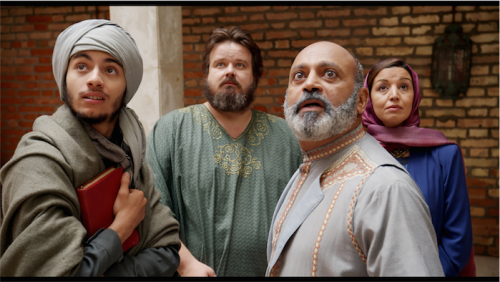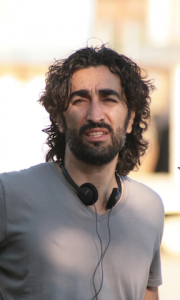
“Pizza and Dates”… the cultural clash is depicted in a hilarious light as sex appeal meets sharia.
The movie, backed with music from the Orchestra di Piazza Vittorio, is set around the idea of multiculturalism in gloriously cinematic Venice, where Kamkari first glimpsed Europe. After a mosque is turned into a ladies’ hairdressing salon by the landlord, a community of Muslims in Venice seek a new location. A young Afghan Imam named Saladin is called to help.

Kurdish Iranian film director Fariborz Kamkari… “The only way to talk about radicalisation and fanaticism was to make it a comedy.”
I caught up with Kamkari by phone to Rome, where he now lives, and asked why he left Iran.
“It’s so complicated, but I was fed up, it’s hard to make a film when you’re a Kurd in Iran,” he says.
“There is very strict film censorship there and it looked impossible… my films are about my world.”
Describing himself as “a child of the war between Iran and Iraq,” the director, trained in theatre and film in Tehran and Amsterdam, says that writing in another language gave him freedom.
“I like it very much, it liberates me, I read a lot, I write a lot in Italian and possibly it’s not as good as my Persian or Kurdish, my mother language, but I can express myself better – it is very strange,” he says.
But why Italy? As a child, he got hooked on a Fellini movie dubbed inaccurately into Farsi to clean up the story.
“At age eight or nine, I saw only half of the real film, but it was so strong. I understood it, and I was in love with cinema,” he says.
Kamkari never looked back. After getting involved in university theatre, he burst on to the film scene in 2002 with his first feature, “Black Tape: A Tehran Diary – the Videotape Fariborz Kamkari Found in the Garbage”, a fictional work told from the point of view of a young Kurdish enslaved by a former general. The film won the top jury prize at Cinequest Film Festival.
But “Black Tape” was banned in his home country, and after ventures such as the detective movie, “The Forbidden Chapter”, he made the move to Italy.
Undaunted by the prospect of making a comedy in another language, he says: “Comedy was the only way to talk about this argument, otherwise I would have made a very, very dark film.
“The film tries to show religious people that there isn’t only one way to translate your beliefs into action – there are many ways to be a Muslim or a Christian.
“The only way to talk about radicalisation and fanaticism was to make it a comedy.
“There’s a scene in my film where the men try to stone a woman who abandoned her husband… comedy made it possible for me to talk about that.”
His choice of Venice was obvious. “It’s a magic city, it’s a mixture of East and West, sometimes you feel as if you are walking in Casablanca or Istanbul,” he says.
“And it’s also a perfect example of the future of immigration, how to mix cultures.”
“Pizza and Dates” (Pitza e Datteri), 1.30pm Thursday, October 1, at 16th Italian Film Festival, Palace Electric Cinema until October 11. Bookings to palacecinemas.com.au/festivals/
The post Arts / Finding a funny side to jihad appeared first on Canberra CityNews.